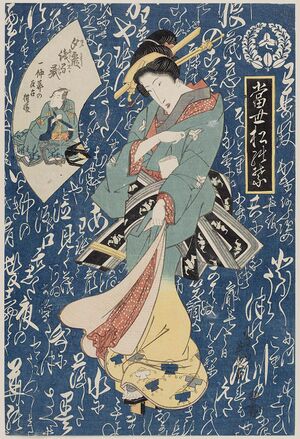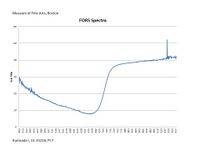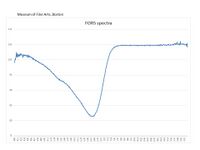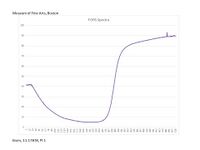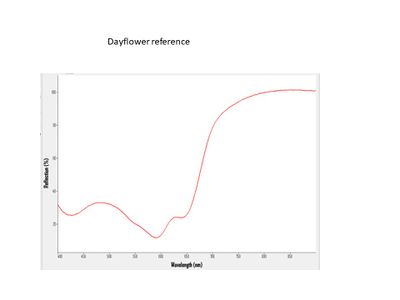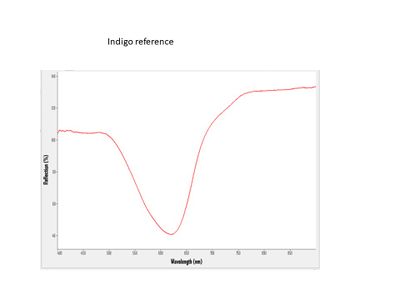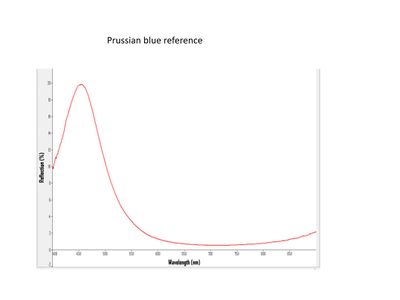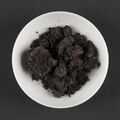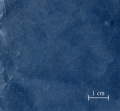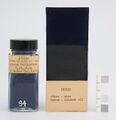Indigo: Ukiyo-e colorant
Indigo 藍 (ai): A natural dark blue dye obtained from Indigofera tinctoria plants native to India, Java, Peru, and other tropical areas. The use of indigo was first mentioned in Indian manuscripts in the 4th century BCE. In Japan, indigo was introduced from China in the 6th century CE. The dye is obtained from an indigo plant native to Asia, Persicaria tinctoria (蓼藍 tadeai). The colorant can also be extracted from indigo dyed cloth or fibers according to Hokusai's illustrated treatise, Ehon saishikitsū (画本彩色通). Indian indigo began to be imported around the end of the Edo period (1603–1868).
Indigo and dayflower are the two blues used in Japanese woodblock prints until Prussian blue enters the palette in the 1830s. Indigo appears most frequently from the 1740s onwards as a color mixed with orpiment to produce a variety of greens. As a single colorant, it appears as a comparatively dull blue color. Due to its poor tinting strength, a relatively large amount needs to be used during printing in order to obtain a good saturation of this color. Its texture is somewhat coarse which makes it difficult to execute graduated hues from dark to light.
Indigo and orpiment are mixed or overprinted to create a green. This mixture is the most commonly seen combination to create a green.
For additional information see: Indigo, Uemura Dye Archive: Indigo 272, 274, 275, Persicaria tinctoria (Kew)
Examples of Indigo in Ukiyo-e Prints
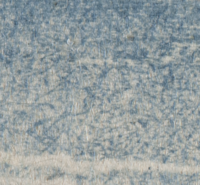
|
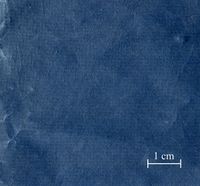
|
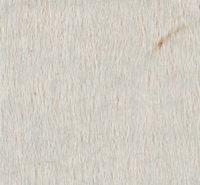
|
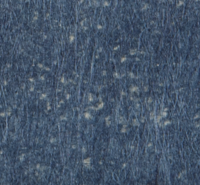
|
Analysis
Fiber optic reflectance spectroscopy (FORS) can easily identify the three blues: dayflower, indigo, and Prussian blue.
Interpretation
- Indigo produces a unique FORS pattern with a clear sharp rise occurring from approximately 650 to 740 nm followed by a high, nearly horizontal line.
- The lower wavelength portion (left side) of the indigo spectrum may not always have a rise. This may be due to discoloration of the paper or other yellowish tones.
Images of Indigo
List of Prints
Below is a list of prints where indigo was detected.
Pages in category "Indigo: Ukiyo-e colorant"
The following 47 pages are in this category, out of 47 total.
E
- Eisen, Geisha at Night under Plum Blossoms, 11.26691-2
- Eisen, Minazuru-hime as Ono no Komachi and Benkei as Kisen Hôshi, from the series Characters from the Life of Ushiwaka as the Six Poetic Immortals, 11.25669
- Eisen, The Song Evening Mist at Asama Peak, on Scrap-paper Fabric with an Itchû-bushi Libretto, from the series A Modern Pine Needle Collection, 11.17878
- Eizan, Kashiku of the Tsuruya, from the series Array of Beauties of the Pleasure Quarters, 11.17716
H
- Harunobu, Osen of the Kagiya and a Young Man with a Cat, 11.19496
- Hiroshige I/Hiroshige II, Ueno Yamashita, from the series One Hundred Famous Views of Edo, 11.35842
- Hokusai, Act IX, from the series The Storehouse of Loyal Retainers, a Primer, 11.17643
- Hokusai, Act VI, from the series The Storehouse of Loyal Retainers, a Primer, 11.17586
- Hokusai, Act VII, from the series The Storehouse of Loyal Retainers, a Primer, 11.17604
- Hokusai, Crossing a Bridge, from the album Men's Stamping Dance, 06.809
- Hokusai, Dance of the Gods at the Heavenly Cave part 1, 11.20434
- Hokusai, Dance of the Gods at the Heavenly Cave part 2, 11.20433
- Hokusai, Exhibition of Flower Arrangements in a Room Overlooking the Sumida River, 11.19658
- Hokusai, Hair Ornaments, 11.20418
- Hokusai, Kajikazawa in Kai Province, from the series Thirty-six Views of Mount Fuji, 21.6773
- Hokusai, Kajikazawa in Kai Province, from the series Thirty-six Views of Mount Fuji, 21.6774
- Hokusai, Kajikazawa in Kai Province, from the series Thirty-six Views of Mount Fuji, 21.6775
- Hokusai, Ki no Natora and Ôtomo no Yoshio Wrestling, 00.1949
- Hokusai, New Year in the Yoshiwara, 21.9223
- Hokusai, The Kaminarimon Gate at Sensô-ji Temple in Asakusa, 11.19640
- Hokusai, The Seventh Month: The Bon Festival Dance, from an untitled series of Niwaka festival dances representing the Twelve Months, 11.19932
- Hokusai, Urashima Tarô Visits the Dragon Palace, from the series Newly Published Perspective Pictures, 11.17547
- Hokusai, Ushibori in Hitachi Province, from the series Thirty-six Views of Mount Fuji, 21.5363
- Hokusai, Ushibori in Hitachi Province, from the series Thirty-six Views of Mount Fuji, 21.5385
- Hokusai, Ushibori in Hitachi Province, from the series Thirty-six Views of Mount Fuji, 21.5386
- Hokusai, View of Koshigoe from Shichiri-ga-hama, 21.9224
- Hokusai, View of Noboto Beach at Low Tide from the Salt Beds at Gyôtoku, from an untitled series of landscapes in Western style, 21.6676
- Hokusai, Woman Buying Songbirds, from the series A Collection of Dances, 11.16773
K
- Kiyohiro, The Attributes of the Seven Gods of Good Fortune, 11.19089
- Kiyonaga, The Brine Maidens, from the series Current Manners in Eastern Brocade, 21.5610
- Kunisada, Actor Nakamura Utaemon III as the Monkey Trainer Yojirô, from the series Great Hit Plays, 11.15095
- Kunisada, Moon Viewing at Mukôjima, a Triptych, from the series Moon, Snow and Flowers, 11.15216
- Kuniyoshi, (Actor Ichikawa Ebizô V as) Inuyama Dôsetsu, from the series The Lives of Eight Brave and Loyal Dog Heroes, 11.28841
- Kuniyoshi, Ruan Xiaowu, the Short-lived Second Son, from the series One Hundred and Eight Heroes of the Popular Shuihuzhuan, 64.800
S
T
- TEST-Utamaro I, Women Overnight Guests, a Triptych, 21.6328-30
- TEST-Utamaro I, Women Overnight Guests, left panel of triptych, 21.6328
- Toyoharu, The Armor-pulling Scene at Wada's Banquet, 11.14704
- Toyokuni, Actor Arashi Kitsusaburô I as the Monkey Trainer Yojirô, in the Horikawa Scene of the Play Oshun and Denbei, 11.30331
- Toyokuni, Woman Under Maple and Ginkgo Leaves, from the series Comparison of Beauties, 11.13642
- Toyonobu, Rain in the Fifth Month, 11.19048
- Toyonobu, Young Couple Burning Maple Leaves to Heat Sake, 11.19676
